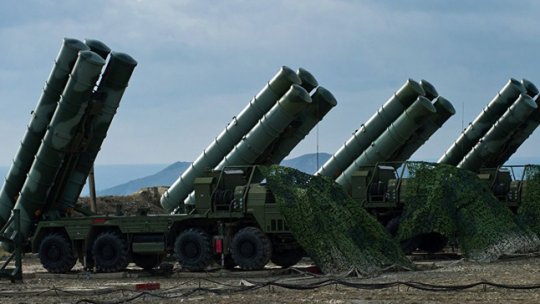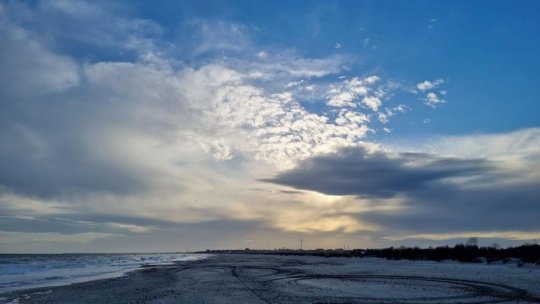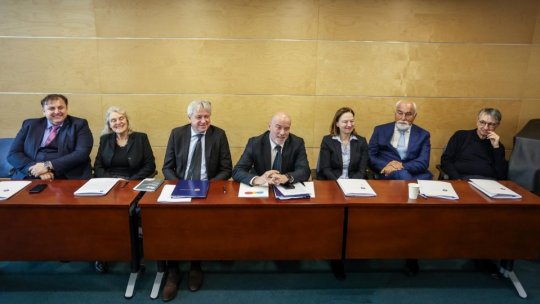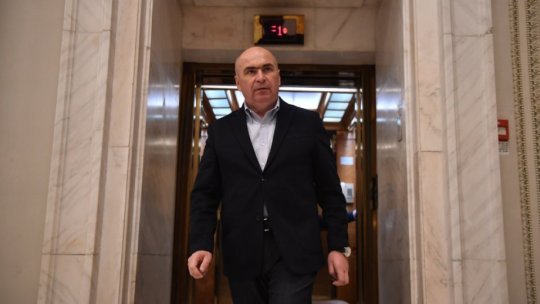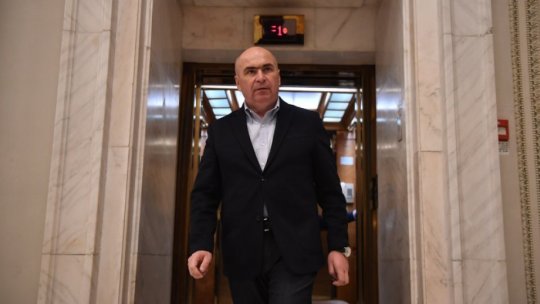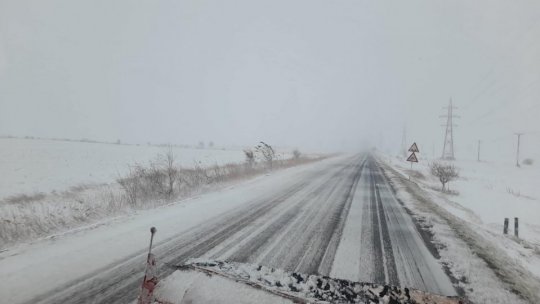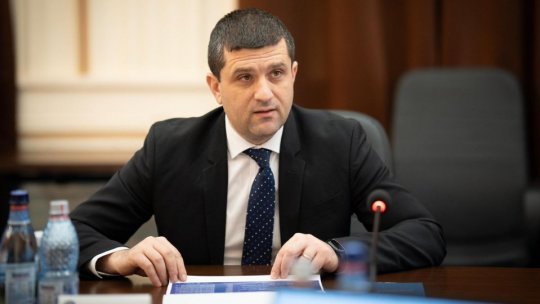Geostrategic developments at the turn of the year
New NATO Commands, Brexit, Iran, Russia, Crimea, North Korea, Turkey, Black Sea, terrorist attacks, hybrid war, cyber attacks, propaganda, disinformation.
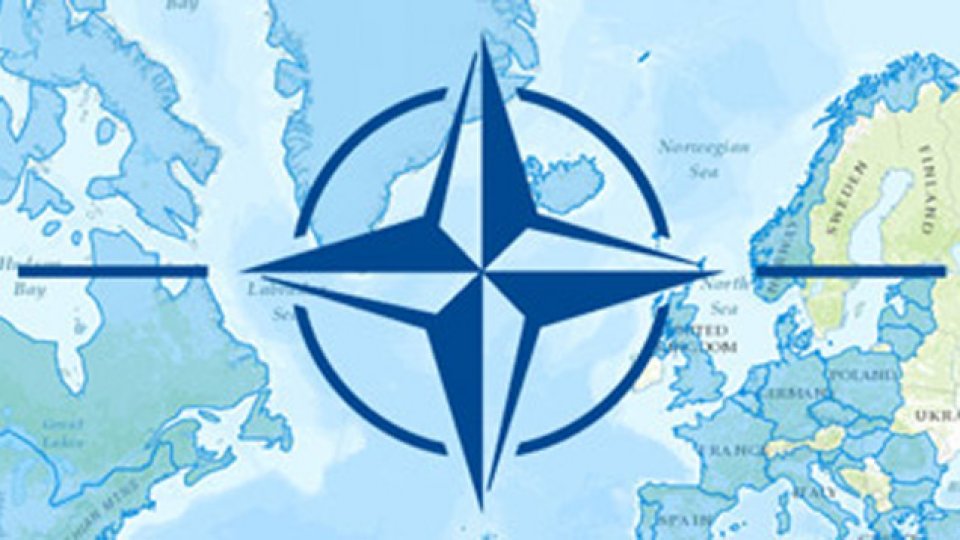
Articol de Radu Dobriţoiu, 31 Decembrie 2018, 22:32
Radio Romania News Producer: Radu Dobriţoiu, military reporter, has analyzed, at the end of 2018, the main geostrategic evolutions, with an impact both on continental and national security, in the "Euroatlantica" radio show of Radio Romania News, broadcasted on 29 December. 2018 was loaded with events on the Euro-Atlantic agenda, with an extremely important NATO summit, which set new Commands of the Alliance, but also new tensions at the East of Europe. We add Brexit, still under discussion in Brussels and London, plus US President Donald Trump's new statements on nuclear agreement with Iran and Intermediate-Range Nuclear Forces Treaty. At national level, we can say that it was the year with the most important military acquisition projects, but also the reorganization of the army, with a General Staff transformed into a General Staff of Defense, with new headquarters. An important new year is announced for Romania, as it will take over the rotating Presidency of the EU Council with a security agenda that includes the European defense project. Special Guest of the edition - Lieutenant General (Reserve) Alexandru Grumaz, Military Analyst, Former Consul General of Romania in Shanghai.
Radu Dobrițoiu: General, about the NATO Summit in Brussels, considering that relations between NATO and the Russian Federation have reached an unprecedented level after the end of the Cold War. Coherent measures were decided in a complex Alliance strategy that adapted itself to Russia's actions after 2014, after the aggression in eastern Ukraine.
Alexandru Grumaz: US Secretary of Defense James Mattis said: "Inter-State strategic competition, not terrorism, is now the main concern in US national security." It means that this preoccupation also becomes a point on the agenda for Europe. If we cut off the media and Donald Trump from the flamboyant statements and images he had at the NATO summit, his speech remains extremely powerful, with the toughest declarations against the Russian Federation, defined as the main enemy of the Alliance (…). That's what we all have to understand. The final declaration in Brussels is tougher than the one in Prague, when the NATO-Russia Council has been established. For us, (Romania, n.a.), the summit meant a lot because it also brought an unprecedented Black Sea reunion. Summit has determined that it is good for allies to allocate more than 32% of investment in military capabilities. Summit also came with commitments to increase forces in theaters of operations and a 25% increase in Afghanistan. One important thing is that with regard to Afghanistan, talks start in Abu Dhabi between the talibans and the United States, the first after 17 years of war, involving Saudi Arabia, United Arab Emirates and Pakistan, which is a very good thing for the security of the Afghanistan area.
Radu Dobriţoiu: How well did Romania support its interests in this last NATO summit, the one in Brussels?
Alexandru Grumaz: Brussels NATO Summit had a final statement of 50 points. It is important for Romania that it has managed to obtain an Army Command, that the Mechanized Brigade in Craiova became operational and is involved in the Alliance's operations and scenarios in the coming period, in 2019. Also, it is important that this discussion took place on the Black Sea, with participation of Member States in the Partnership for Peace, Ukraine and Georgia, which at the time of the Montreaux Convention did not exist.
Radu Dobriţoiu: Europe has had a difficult time, with terrorist attacks, but also with a difficult dialogue with Russia.
Alexandru Grumaz: Situation in Europe is a little different, in the context of entering a new world geo-economic order, characterized by a strong rivalry between the US, China and Russia, and on an economic one, between China and the US, these economic tools are used to achieve strategic goals. Europe, unfortunately, is going through a very difficult time. Theresa May with Brexit, Macron is in a free fall, Merkel is preparing to leave the scene, and Western European countries are facing populist and extremist pressures. Rescue and relaunch of the European project, in my opinion, falls on the shoulders of the East European countries, Romania, Poland and the Baltic countries, because these people believe in the viability of the EU.
Radu Dobriţoiu: Brexit is another important theme within the geostrategic evolutions, from the perspective of Euro-Atlantic security. How much will Britain's withdrawal from the EU affect things?
Alexandru Grumaz: It will be a very complicated matter. First of all, we do not know whether Theresa May will be able to pass this Brexit project through the UK Parliament. It's an almost unexplained question of how a nation, once the strongest in the world, has come to withdraw. We know that Britain has not had such a good opinion about the European Union. UK joined in 1975. Well, things have changed a lot, including people. Not only Nigel Farage was in favor of UK leaving the EU, but also Boris Johnson, who was a member of Cameron's party, wanted the same thing. The vote in 2016 gave rise with two per cent to those who wanted to leave the European Union. You know May was against leaving the European Union at the time. May was the one who opposed the exit and voted for UK to stay in the EU.
Radu Dobriţoiu: There was a lot of discussion in the European defense area about Britain's withdrawal from the EU, the area of cooperation on exchange of essential information. Will there be a breach in this area?
Alexandru Grumaz: Surely the ability to react, in the event of a European crisis, will be reduced. At present, France remains the most powerful army in the European Union, and I think it is very important for this to be seen on the ground, too. Europe generally has interests in Africa, especially in the French area.
Radu Dobriţoiu: France has expeditionary troops /.../
Alexandru Grumaz: Exactly. The idea of carrying out this European army is an idea that does not seem to me to be viable, because what we have at the moment is exactly what we need. In a November 16 interview at the Halifax Security Forum, Stuart Peach, Chairman of the NATO Military Committee, stressed that NATO is a single-force structure with a unique command and control network and a single process planning, which is true. It is very easy to order an army that has cohesive structures, commands ...
Radu Dobriţoiu: Also on Brexit, but this time in the Euro-Atlantic geostrategic development vision, do you think that Britain will come closer to the US, but will continue in the European security area at the same time?
Alexandru Grumaz: No. The US is looking very closely to Eastern Europe. If the US looks with interest to Eastern Europe, UK will also look with a lot of interest to Eastern Europe, which I believe is extremely important. In fact, Air Police, ships that came to the Black Sea were also British, our collaboration with British military troops is very good, and I think the UK will take a closer stand towards the Baltic countries, Poland and Romania.
Radu Dobrițoiu: Both in terms of military presence and cooperation with the European states, that's what you want to emphasize.
Alexandru Grumaz: Exactly, because we look at President Trump's first visit to the European Union, he stopped in Warsaw, he stopped on the eastern flank of the Alliance, a flank that must be reinforced to resist a possible aggression by the Russian Federation in one of the allied states in the region.
Radu Dobriţoiu: Now in terms of disinformation and propaganda, specific to the hybrid war, part of the information operations carried out by the Russian Federation. Contemporary war is also going on in the online environment, on the Internet, but also with information and propaganda specific to the 21st century. It now comes to mind a Russian word, Maskirovka.
Alexandru Grumaz: Maskirovka.
Radu Dobriţoiu: We have had a year dominated with such actions at European and national level.
Alexandru Grumaz: I will take another perspective on this hybrid war that Russia is leading. Prior to detention of the three Ukrainian ships, there was a massive cyber-attack in Ukraine to collect the information needed for this operation. Secondly, the American Congress prepares the report on the 2016 elections. A senator said it was an informatics Pearl Harbor, another said 'nine-eleven' ...
Radu Dobriţoiu: Informatics too..
Alexandru Grumaz: ... all informatics. We still do not know the real dimension of the Russian cyber-attack in America, we do not know the real dimension of the Russian cyber-attack in the European countries. On the occasion of the elections, we do not know the current one for important infrastructure structures: banks, army. All of this is in a continuous movement and the scale is extremely high.
Radu Dobriţoiu: We have the events in Paris, we had the US elections.
Alexandru Grumaz: Yes, in Paris there were a thousand Twitter accounts that were used by hackers from the Russian Federation to spread these maskirovka news. These things are very thoroughly prepared, with a certain plan. So I guess this is a general plan that is being worked on.
Radu Dobriţoiu: An American expert (…) was talking about this involvement of the Russian Federation through disinformation, including during the European Parliament elections.
Alexandru Grumaz: The 2019 European Elections are essential for the European Union, because they can bring with them anti-European and extreme-right movements inside the European Parliament. These things complicate the situation even more and that is why these elections are extremely important for the future of the European Union.
Radu Dobriţoiu: Russia: do you think it will get involved in these elections?
Alexandru Grumaz: Definitely.
Radu Dobrițoiu: In what sense? Because we are talking about disinformation.
Alexandru Grumaz: That's exactly what it is, it is a media Pearl Harbor that Russia has practiced in America and is now practicing across all Europe.
Radu Dobriţoiu: General, the nuclear treaty with Iran was denounced unilaterally by the United States. What does this decision mean and what will it bring in the future?
Alexandru Grumaz: This decision would already concern the West, the United States on the side of Israel and Saudi Arabia, who are at war Iran and the economic interests of the West, that are currently trying to avoid this embargo the United States imposed on Iran.
Radu Dobriţoiu: There are economic pressures generated by the measures taken by the United States, which have led to a decline in purchasing power within Iran.
Alexandru Grumaz: Exactly. I believe that, from what I saw, there are also French companies, English companies, German companies who have given up the contracts they have opened with Tehran. So, these things happen, America, Boeing gave up the 1 or 2 billion dollars contracts it had with Tehran. So in a way, these things, in this globalization, are expanding. It is discussed at bilateral level. The United States has discussed at bilateral level with both India and China.
Radu Dobriţoiu: Let us emphasize, however, that the European Union has a different position from that of the United States.
Alexandru Grumaz: The European Union has a different position, indeed. You see, situation in the EU is very delicate. The three big European powers, the ones at the table – now it will only be France and Germany, to which I add the United Kingdom - are strongly weakened by this Brexit, which consumes all the energy. Instead of dealing with serious issues, it deals with these negotiations on the UK exit. Germany has entered the mercy of a post-Merkel renewal. France disengages from Emmanuel Macron, because ...
Radu Dobriţoiu: It's rather a test.
Alexandru Grumaz: No. He has dealt with the problems of the European Union and has forgotten his own citizens. See you, it's a situation ...
Radu Dobriţoiu: I think he will re-adapt to what is going on, Emmanuel Macron. He is indeed in a very difficult situation.
Alexandru Grumaz: Let's hope he will re-adapt, but I tell you one thing: at the moment, the situation is between those who live in the countryside and those who live in the cities. Donald Trump was elected by ordinary citizens who were against institutions that have been built over time in the United States. Macron was elected on a wave of dissatisfaction with the previous French administrations.
Radu Dobriţoiu: New developments in North Korea's denuclearization efforts, an unpredictable Kim Jong-un.
Alexandru Grumaz: I see a scenario that will end up with the conclusion of peace between the two countries, but North Korea will never give up nuclear weapons.
Radu Dobrițoiu: How do you expect the United States to continue its dialogue with North Korea?
Alexandru Grumaz: Dialogue will continue, but this does not imply resumption of military exercises in the respective area. In the north, you know, there is a situation between Russia and Japan on the Kuril Islands. Japan, in the case of peace settlement between North Korea and South Korea, is at a disadvantage at the moment so Russia has proposed Japan a deal with the Kuril Islands, to offer back two small islands and to administer together two other islands there. I do not think Vladimir Putin is making concessions just for the sake of concessions. In any case, there too is a delicate matter. That whole area is a conflict zone. If we look a little bit further, we see the South China Sea, where conflicts can generate at any time in a military affair.
Radu Dobriţoiu: Getting back to the Black Sea, let’s talk about Turkey, where President Recep Tayyip Erdogan has increased powers as of application of the new constitutional provisions. How do you see the evolution of Turkey on the basis of what happened over the past year ?
Alexandru Grumaz: In my opinion, it remains a firm ally of NATO. So Turkey will remain in NATO, it will ensure the southern flank, because the deal it will make in a very near future with the United States, the new arrangements will benefit Turkey strategically and militarily. Perhaps Kurdistan will also be reorganized. Perhaps they will keep that area around Afrin they occupied during the Olive Branch Operation. The point is that President Erdogan is the only force capable of opposing Russia-Black Sea. It is the only one that has enough submarines - 13 – is now building a carrier, has a fleet, and builds a military port in the Black Sea. It is the only one who has a very good relationship with Ukraine. Already in the military field they have started to work together. They want to buy tank engines from the Ukrainians. They want to make together a military transport jet, so these things are starting to move in this area, though it seems to be close to Vladimir Putin, it's not. And I say, although they did the South Stream, they inaugurated it together with Vladimir Putin, there are other strategic interests there and I mean the Balkans, the flow of gas from Turkey to the Balkans.
Radu Dobrițoiu: Let's look at the Crimean Peninsula, where Turkey is directly interested in the Tatars there.
Alexandru Grumaz: Yes, it is. Crimean Peninsula is a much more delicate matter. The fact that Russia occupied it, turned it into a military aircraft where from it can launch S-400, S-300 type missiles, Panţir, Bastion ...
Radu Dobriţoiu: Iskander-M.
Alexandru Grumaz: ... Iskander M, and can trigger an electronic war. In fact it built an A2 / AD ban area and around the platforms it took from Ukraine it organized so very effective anti-aircraft defense areas and leaving only one narrow aisle to Odessa. So, problem is not only in Kerch, but also in the area. Kerch can be shut off with a trans-container ...
Radu Dobriţoiu: Transversally placed.
Alexandru Grumaz: ...there is a fleet moving from the Caspian to the Azov Sea. It should be borne in mind that Crimean peninsula is the ramp of the Russian Federation to the warm seas, to the Mediterranean and from Mediterranean to Tartus, using cruise missiles, you win over all over Europe.
Radu Dobrițoiu: The United States has threatened, through the voice of President Donald Trump, that it is likely to withdraw from the interim nuclear power treaty. How do you think, General, that this topic will evolve?
Alexandru Grumaz: For the moment we are at the level of political statements, we are not at the level of measures. So, this withdrawal must be notified 60 days before taking action. Clearly, the position that the United States will have in Washington is clear, Congress agrees with this withdrawal, especially as China has been proposed to enter this treaty. In fact, the big problem is that China has developed a lot of missiles that violate the INF Treaty and at the moment if you look at how many medium range ballistic missiles are there for a carrier, around 1,200 for a single aircraft carrier.
Radu Dobriţoiu: Chinese ...
Alexandru Grumaz: Yes.
Radu Dobriţoiu: For a single American aircraft carrier.
Alexandru Grumaz: Yes. One of the 11. So there is a great risk for the US fleet in the South China Sea. In future, I see a US-Russia-China triangle of negotiations, in which one will ally with another, against the third....
Radu Dobrițoiu: And these alliances will probably fluctuate.
Alexandru Grumaz: They will. It is an economic war that leads to geostrategic measures, solving geostrategic measures.
Radu Dobriţoiu: At national level, we can say that 2018 was the year with the most important military equipment acquisition projects, but also with the reorganization of the army, with new Commands. Romania has already paid two Patriot missile systems out of the seven proposed ones. How important are these systems for national defense, but also for the eastern flank of NATO?
Alexandru Grumaz: Romania has a visionary military acquisition program, which is an extraordinary thing. So far we have not made purchases, we have talked about purchases, tried to make acquisitions, we made auctions we did not respect. Well, we have now started doing an approved program in the (Supreme Council for Country Defense n .a.) CSAT for the purchase of military equipment in Romania. What happens with these Patriot missiles? It is a very welcomed purchase, it is a state-of-the-art Patriot system and provides antiaircraft defense of key areas. One of the key areas is Constanţa, the second is Deveselu and we have others, Câmpia Turzii and so on, there are areas that are of particular importance. Plus, we need to add HIMARS. We will be the only country in Europe to operate this system.
Radu Dobriţoiu: Let's recall that also in the past year began the acquisition of Piranha 5 ...
Alexandru Grumaz: Yes, and production in the country will follow. It's very good.
Radu Dobriţoiu: Modernization process for the frigates has started..
Alexandru Grumaz: We are waiting to see who is winning the auction.
Radu Dobrițoiu: And also the corvettes, because they are in tandem, acquisition of corvettes
Alexandru Grumaz: It is very good that the purchase was made like this, because they initially started only with the production of corvettes. These frigates had to be upgraded and brought to the standards to which they could be used in a possible conflict.
Radu Dobriţoiu: The auction and offer includes this possibility ...
Alexandru Grumaz: Yes, it's very good they were coupled.
Radu Dobrițoiu: ... offset between acquisition of corvettes and, of course, modernization of the two T-22 frigates will also be included.
Alexandru Grumaz: We are looking forward to a tender for hunting planes or direct purchase through a dialogue ...
Radu Dobriţoiu: The F-16 have been mentioned again ...
Alexandru Grumaz: Yes, but I say we have to get new F-16.
Radu Dobrițoiu: General, also over the past year there has been another important acquisition - coastal batteries, anti-ship missile systems.
Alexandru Grumaz: Here are the American options, the French options ... those that were used in the war ... Sea Sparrow is good, just like Exocet, so we can use any of these. But if we can produce them in the country, at least some of the parts ...
Radu Dobriţoiu: Ploieşti is being considered ...
Alexandru Grumaz: I know. Electromechanical Plant there has a long tradition in missile construction.
Radu Dobriţoiu: An important new year is announced for Romania, because it will take over the rotating Presidency of the EU Council, with security agenda that includes the European defense. We are talking about Permanent Structured Cooperation PESCO. Out of the 17 joint defense projects, Romania has committed to four, one of them in conjunction with Austria, a country from which we will take over the Presidency. Will this project be separate from NATO or in connection with the Alliance?
Alexandru Grumaz: No, PESCO is in connection with NATO, it is a complement, an appendix, if you will, of programs that help the technological reconfiguration of the Alliance. France and Germany also want to produce a tank, a plane. So these things are very welcome. This, indeed, is an initiative that helps NATO.
Radu Dobriţoiu: "Euroatlantica" at the end. We have discussed the “Geostrategic developments at the turn of the year”. Special Guest of the edition was Lieutenant General (Reserve) Alexandru Grumaz, Military Analyst, former Consul General of Romania in Shanghai. I am Radu Dobriţoiu and, together with Producer Nicu Popescu, thank you for joining us at RADIO ROMANIA NEWS!
Source:RRA.Translated by Miruna Matei

